
Cette critique peut contenir des spoilers
"If you keep on believing, the dream that you dream will come true." -Cinderella
Two of my favorite Chinese actresses, Zhou Dong Yu and Zanilia Zhao starred in The Palace. More Cinderella fairytale than actual historical tale but entertaining nonetheless.Chen Xiang and Liu Li came to the palace as 13 year-old girls to serve as maids and became fast friends. Chen Xiang lost her earring in an abandoned garden on her first day, think Chekov's gun or Cinderella's slipper. Quickly fast forwarded 7 years, the two turned into Dong Yu and Zanilia, now twenty-year-olds still prone to giggling and screaming. Each had their dreams of winding up with a handsome prince no matter how remote the possibility. But in fairytales even remote possibilities can become reality. Chen Xiang met the 13th Prince once again in the abandoned garden only this time she wore a scarf over her face as they had a chaste memorable time. Liu Li, uh, banged into the nefarious 9th Prince. Before you could say mistaken identity the 13th Prince and Liu Li were to be married. Chen Xiang found herself becoming her friend's servant while Liu Li turned into a wicked stepsister to keep their secret.
Chen Xiang was the childlike, virginal, self-sacrificing heroine complete with a repertoire of giggles and screams. Liu Li with her lusty desires for sex and power went from fast friend to Fast Times at Ridgemont High turning evil at the drop of her clothes. There was never much of a reason for Chen Xiang to keep her secret other than to be the traditional martyr and long suffering heroine. I wasn't crazy about the portrayal of the young women. In this fairytale all women were considered pretty much alike and were designed to please men in order to have any security, which given the times probably wasn't too far off the mark. There was no shortage of examples of what happened to maids or concubines who failed to please. The fact that the 13th Prince couldn't tell them apart reinforced their interchangeable nature.
The costumes and sets were luxurious, with mood fitting lighting and exquisite cinematography. Every shot was beautifully framed. No pumpkin coach or mice, but there was a stunning CGI dragon and lots of luminescent butterflies. The actors were cornered into stereotypical roles but still managed to bring their characters to life.
Once the movie got past the giggling, so much giggling, it became more enjoyable for me, even when it dipped into melodrama and political intrigue. Being a fairytale all that mattered was the romance and Chen Xiang winning the Prince's heart through her kind and selfless acts. But it was a Chinese fairytale so that meant being able to avoid being beheaded, beaten to death or exiled in the process.
9/5/22
Cet avis était-il utile?
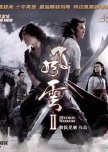
Cette critique peut contenir des spoilers
Hard to Be Righteous, but Easy to Be Evil...
Ekin Cheng and Aaron Kwok returned as the characters they made famous a decade earlier in Storm Riders. Wind and Cloud were an unbeatable team who kept the bad guys at bay until The Evil Lord Godless and his son Heartless with their Japanese army kidnapped the emperor and searched for the treasure within the Dragon Tomb.I enjoyed The Storm Riders (1998). It was cheesy and the CGI was rudimentary, but the story was coherent and the action fun. The Storm Warriors (2009) took itself way too seriously and replaced storyline with endless slow-mo action scenes. Dialogue and character development were kept to a bare minimum. If you haven't watched the first one it may not matter because the atmospheric boys were hard to distinguish with the poor writing for them.
Simon Yam as The Evil Lord Godless seemed invincible and pretty soon it was just Wind and Cloud left to fight him and save China. They didn't have long for a super charged training montage so that they could take their revenge on the over-compensating dressed warlord. Wind went to Lord Wicked and took the, well, wicked route via an evil mud bath while Cloud went the righteous way and was trained by the wounded Nameless at the same time. Before you could say Buckets O' Blood, super slow motion, comic book style fighting with plenty of dismemberments and red goo flying through the air, took place and Cloud had to try and bring Wind back to the good side.
The story was frightfully thin and convoluted. Shu Qi knew what she was doing when she passed on the sequel and left her role to Tiffany Tang. The movie could have easily been 20 minutes shorter if the fights had been shot at regular speed. By the last twenty minutes I didn't really care about the consequences or who lived or died I just wanted it to end. A few of the fights were beautifully shot and the CGI was better than the first movie, but they dragged on at a glacial speed. When CGI replaces actual story and character development I lose interest quickly. During one of the overcooked fight scenes I really thought one of them might yell out, "Kamehameha!"
The Storm Warriors had a cast I was very excited about but they were criminally underused. Ekin and Aaron had grown as actors since the time Storm Riders was filmed but it was irrelevant as most of the time they were filming fight scenes in overly dramatic slow motion. They certainly didn't have to worry about learning many lines. Simon Yam was at least properly menacing as an undefeatable warlord, a nifty trick given how little time he had on screen. Nicholas Tse as Heartless had little to do except look pretty and scowl. Charlene Choi as Dream had little to do but look pretty and worried for her few scenes. Even for comic book characters the lot of them were mostly lifeless. Ultimately, I didn't care about any of them.
The OST was nice if melodramatic at times. As with many of the movies in this genre, the costume department used a lot of leather, gold lame, and metal looking armor. There was no shortage of wind machines as Ekin and Aaron had their long layered mom hairdos seemingly always flowing in the wind.
If you enjoyed The Storm Riders, don't get your hopes too high for this sequel. Several storylines were left dangling, completely forgotten. Maybe I am truly the Heartless one because I actually laughed during the last scene which I'm sure was so supposed to be emotional but came across as absurd to me. As one of my favorite TV baking judges would say, The Storm Warriors was style over substance. It might have looked good, but it didn't taste very well going down.
8/24/22
Cet avis était-il utile?

Ghidorah, the Three-Headed Monster
6 personnes ont trouvé cette critique utile
Cette critique peut contenir des spoilers
Dream Team vs Ghidorah the Three-Headed Monster!
Earth is imperiled when a meteor drops a world ending monster in her lap. King Ghidorah threatens all life on Earth and only a reluctant team of Kaiju can stop him led by Godzilla.This movie is a fun monster ride. The writers threw everything at the screen in order to entertain the audience-a foreign princess with a death squad after her who is taken over by an alien presence (from Mars, Venus, or Jupiter depending on the version you watch), a police officer trying to protect her, an intrepid and annoying female reporter, various scientists, and a doctor who will look familiar to fans of Kurosawa movies.
The alien inhabited princess tries to warn the earthlings that danger in the form of the three-headed fire breathing Ghidorah is coming their way and that Rodan is waking up from inside a volcano. Everyone thinks she's a crackpot. Shimura Takashi as the doctor runs a number of tests on her to see what's going on inside her head even as the death squad appears with guns blazing. The Cosmos return to help out and warn that Rodan and Godzilla are headed back to town. Finally, people decided it's time to start running and screaming as the three giants make their presence known.
Ghidorah rains down destruction upon the people in town while Rodan and Godzilla fight each other in the countryside. Mothra, in her caterpillar form, arrives to try and convince them to fight together against a common foe to save humanity. And their response was, "what's humanity ever done for us?" When Ghidorah attacks the squabbling monsters, the story finally picks up and it is a royal rumble for the ages.
Ghidorah the Three-Headed Monster feels like a movie aimed more at children than adults, but there is enough for adults to enjoy, too. Even though the movie spends too much time leading up to the monster fights, the humans and human-alien were more entertaining than in Godzilla movies from this era. Ghidorah was nearly always a worthy opponent for Big G and it was fun to watch the Dream Team of Kaiju take him on. If you enjoy the Showa era movies, this is definitely not one to miss.
Cet avis était-il utile?
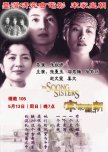
Michelle Yeoh’s sister married a wealthy banker. Maggie Cheung’s sister married the revolutionary and ultimately leader of the Nationalist party, Sun Yat Sen. Later she was an integral part of the communist party. Vivian Wu’s sister married Chiang Kai Shek who would take over the Nationalist party after Sun’s death and later she would become the First Lady of Taiwan. And that’s about the extent of my knowledge on this subject.
I take all historical movies with a grain of salt, everyone has their own agenda or message they want to get across. I’m even more skeptical when governmental censoring is always lurking in the background. Someone else with more knowledge about Chinese history will have to judge the accuracy of the historical aspects of the story.
Purely as a work of art, The Soong Sisters was lovely to look at. The cinematography, sets, and costumes were lush. The OST gave the right amount of mood to the scenes that took place across several decades. Plus, I'm always happy when a film is F rated, Mabel Cheung was the director.
The actresses all gave strong performances. Wu Hsing Guo was quite charismatic as the mercurial leader, Chiang Kai Shek as well.
Where the movie faltered for me was that the sisters were rather thinly drawn. Ostensibly a movie about three powerful women, two who were the wealthiest in China at one point, the other a communist icon, should have fully developed the complex characters and given these talented actresses something to sink their teeth into.
Maggie’s Soong Ching Ling was the only sister who came across as three dimensional as she worked with the communist party to maintain the integrity of her husband’s legacy. Michelle’s Soon Ai Ling had the smallest role of the sisters. The tag line indicated she loved money, but there wasn’t much evidence of that. Vivian’s Soong Mai Ling seemed more like an infatuated school girl for most of the movie, finally developing a backbone in the last quarter of the story.
It felt like the three women were ignominiously dropped from era to era and place to place. Much of the time I wasn’t sure where or when the story was taking place. Their father’s story would have been fascinating to see made into a movie, but by devoting so much time to him and the women as children we missed out on the real meat of the story. His presence did loom over them as he had wanted a new China. Was his dream all that motivated them? What were they thinking? What kind of relationships did they have with these powerful men? Two of the them never had children, did that cause any conflict in their relationships? Extreme hardships were glossed over. The film did touch on the political conflicts between Chiang Kai Shek and Soong Ching Ling, he was bitterly opposed to the communist party and she had given up on the Nationalist Party when he took over and ordered purges. I can't even imagine how strained those family dinners were when they got together.
With all the wealth, power, egos, and rivalries, there should have been more depth to the characters and story. The Soong Sisters was a beautiful pool of water to look at, unfortunately these still waters didn’t run very deep.
Cet avis était-il utile?

Lena is a descendent of Koreans who were forced to work for the Japanese mining coal in Sakhalin and then later trapped there after WWII. Their story would make an interesting film in and off itself as they fought for citizenship and many fought to go back to South Korea. They became second class citizens in Russia and those who made it home were less than in South Korea as well. Lena wants to bury her parents' ashes in South Korea and becomes a mail order bride to make the trip. This aspect is barely touched on and again, would have given more depth to the story to explore that process.
The male lead is a tea farmer in a remote area which lends itself to some lovely cinematography. He tries very hard to make Lena feel welcome and give her anything she needs. Lena in turn tries to help with different chores to show that she is invested in the relationship. She calls him ahjussi throughout the movie which seems to make their relationship an even further oddity. As she walks to the fields she makes friends with a photographer who is traveling through and begins learning to take photographs. Both the film's cinematography and her photos play a large role. Lena tends to be quiet, walking and taking pictures as she has much on her mind. I wish we'd been more privy to what was weighing so heavily on her.
The last thirty minutes or so give the movie the emotional thrust it sorely needed. While this was a beautiful, quiet movie, it could have been more meaningful if only the director had stirred the calm surface with the emotions running beneath.
Cet avis était-il utile?
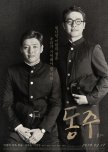
Dong Ju: The Portrait of a Poet
6 personnes ont trouvé cette critique utile
Dong Ju: The Portrait of a Poet is an eloquent story woven around the poet's own insightful words. Shot in black and white, the monochrome film beautifully fits the quiet, intense mood of the short lives of these two young men.
I will leave the historical aspect of this film to those who have a personal stake in it or are more well versed in it than I am.
This film is as much about Yun Dong Ju's cousin and revolutionary, Song Mong Gyu, as it is the poet. Their lives are intertwined, two different ideals in how to resist during a time of hated occupation. One willing to use a gun, the other a pen though at times those lines blur. Their friendship though challenged never waivers.
The story begins and ends with the young men in prison. The present takes place during Yun's interrogation by the Japanese. As Yun is questioned, the past is revealed to show the steps they took to end up in prison. Quoting Yun's poetry to the corresponding events paints the conflicted feelings he had over his role during the dark times and his attempt to find hope in the moment. The tripod of present, past and poetry is perfectly balanced.
Kang Ha Neul gives a restrained and poignant performance as Yun's younger self and later as the tortured prisoner knowing death is imminent, reflecting on his actions and inactions. All the performances are good but his stood out as the titular character.
Dong Ju is an elegantly filmed story of an inelegant and agonizing time told through the courage, defiance and beauty of poetry and a poet.
Prelude
Wishing not to have
so much as a speck of shame
toward heaven until the day I die,
I suffered, even when the wind stirred the leaves.
With my heart singing to the stars,
I shall love all things that are dying.
And I must walk the road
that has been given to me.
Tonight, again, the stars are
brushed by the wind.
-Yun Dong Ju
Cet avis était-il utile?

Days We Stared at the Sun
6 personnes ont trouvé cette critique utile
The production values of this older Taiwanese drama weren't terribly high yet it felt real and honest. If it had one flaw it's that it confronted too many social issues and was unable to spend enough time on each for the characters and the audience to fully digest their consequences.
Days We Stared at the Sun was gritty, raw, and devastating with glimmers of hope quietly woven through the unlikely friendships.
Cet avis était-il utile?

Unless one is familiar with the book it's hard to get a handle on how this world works, because they simply did not spend the time needed to build it for us. The leads bonded together faster than Wolverine and Rogue with a similar relationship dynamic. The gruff, world weary, reluctant hero and the abandoned young woman with a power that frightens people.
It felt like the FL's one acting note she was given was to stand there and look pretty and forlorn. Not a lot of depth to the performance. The ML spent most of his time running and jumping which to his credit, he did well.
The CGI was very good and creative. The problem for me was that the story overly-relied on it and over-estimated how interesting it is without an emotional story to propel the characters through the monsters and labyrinths.
It's a shame they didn't spend a few more minutes developing these characters because there is an interesting story behind the wall of CGI.
Cet avis était-il utile?

"When raising a blade and bringing it down, just think of nothing"
The Double was a wild ride revenge lollapalooza that didn’t seem to take itself too seriously at times. There were plot holes deep enough to bury bodies in and 30-year-old actors playing teenagers. I didn’t really care that it was messy for the most part as the two leads were engaging to watch and I love a good case of comeuppance for evil doers.Long story short, Xue Fang Fei has to take the identity of Jiang Li in order to avenge both of them and right injustices. Despite looking exactly like XFF, everyone seems to accept the new identity since the real Jiang Li had been hidden away for 10 years. Duke Su is hard to fool and initially uses XFF as a pawn though he also enjoys “the show” that usually surrounds her as she takes down her enemies and Jiang Li’s one at a time, occasionally asking for his help. XFF’s compassion and intelligence help her make allies and friends along the way. A constant fighter for justice, she also makes numerous enemies prepared to end her life.
I enjoyed Xue’s calm demeanor as she plotted and planned. Her relationship with the equally scheming Duke Su who also needed to right wrongs and protect the country was a delight to watch. Xue Fang Fei was fairly well developed and while not realistic in some cases, I was happy they let her solve many of her own problems with an occasional assist from the Duke. She was laser focused, fiercely protective of those around her, and never stooped to her enemies’ methods in her desire for revenge and justice. Duke Su lacked the complexity of other characters but Wang Xing Yue’s performance at least made him moderately interesting as the fan waving mastermind. The murderous and increasingly deranged Shen Yu Rong was given more writerly care. However, I never connected with Liang Yong Qi’s bland portrayal of the cowardly, whining, court officer who simply could not cognitively accept responsibility for his heinous actions. Li Meng as the Princess Wan Ning made up for his stone face as she chewed the scenery when she wasn’t throwing it. Several of the villains were given all sorts of reasons for becoming the way they were which did not give me one ounce of sympathy for them. They made choices to pass the buck and pass on the pain.
For whatever reason, I’ve never had a problem with cross-dressing. I was even able to go along with everyone buying that Xue Fang Fei was Jiang Li. Where my brain seems to have drawn the line is 30+ actors playing 15–17-year-olds. The hardest part for me was in the early episodes when the writers kept reminding me that Jiang Li and her friends and sisters were teenagers. When the Jiang family said Li looked different, that was because the seven-year-old they sent away ten years ago came back a grown-ass woman! Despite some of the other actors playing up being immature, Wu Jin Yan didn’t look or carry herself like a teenager. The character was also written with a wealth of knowledge and experiences that seemed beyond her age. When they finally stopped mentioning how young she was it helped me to accept her as the crafty, complex, elegant adult she acted like.
This drama loved its overly dramatic moments. So much twirling, whirling, and cape wearing. The drama world also suffered from insane climate change as one scene had petals falling from the sky, the next had snow, then back to petals, and for most of the drama, Duke Su’s tree at his mansion was ever autumn. Very few scenes passed without something falling from the sky or the Duke flying in for a visit. The wind usually only blew on the one showing emotions, even when characters were standing side-by-side! There were magic pigeons who always knew the address of the current villain- not exactly how carrier pigeons work. The non-disclosure agreements were lethal. And there was no shortage of knockout karate chops, people going insane, princess carries, and amazing guyliner! The only thing underdone was the anemic white makeup for the women.
While I enjoy corrupt officials and lying, murderous family members being brought low, the story had a tendency to become redundant in order to fill the episodes as XFF righted wrongs in the Xue family, the Jiang family, and in the country. Characters, conflicts, and backstory were being added right up until the last four episodes. There were times I lost interest as the villains (so many villains!) monologued about how they were going to bring XFF down. Maybe if they’d cut down on some of the villainous plotting there would have been time for a more well-crafted ending. It felt like they had a closing scene they wanted to show and tried to twist the plot to make it happen which came across artificially. I would also like to have seen more meaningful scenes with the leads. XFF and the Duke suffered physical and emotional wounds that were often forgotten the next day. I will not even get into that coitus interruptus candle.
If it sounds like I didn’t like The Double, that would be wrong. While it was deeply flawed, it was also fun and I have a high tolerance for cheese, especially with a truly strong female lead. Wu Jin Yan and Wang Xing Yue had great chemistry and I enjoyed many of the side characters, especially the bickering and loyal Wen Ji and Lu Ji. I liked Xue Fang Fei and thought she was a memorable heroine for being intelligent, resilient, and compassionate if not a little too perfect. What would have made it a better “show” is if the writers had developed Duke Su to be as memorable a player in the revenge tour ensemble as his leading lady.
7.75
26 July 2024
Cet avis était-il utile?

Cette critique peut contenir des spoilers
Time manages to weave together the disparate stories of a retired assassin team, the problems of the elderly, assisted suicide and team pregnancy. It brings together a cast of well-known older Hong Kong actors---PatrickTse, Bobo Fung, and Lam Suet and gives them a chance to shine. They did not fail to take advantage of the opportunity to show that they've still got it.Patrick Tse at 85 showed he could still be a menacing threat as the flying blade assassin who had been relegated to cutting noodles in his golden years. Bobo went from terrorizing her victims with her throwing weapons to singing in a small-time cabaret. Lam Suet, the getaway driver, now suffering from various illnesses and struggling to pay for and receive proper medical care spends his free time with a prostitute he's fallen in love with.
Without being morbid, Time shines a light on the plight of the elderly---illness, loneliness, ungrateful children, poverty, and the knowledge that more sand has run out of the hourglass than remains. The old team gets back together when they find the older population requesting their services and they earn extra spending money respectfully doling out assisted suicide. This works out fine until the blade man discovers his intended victim/client is a teenage girl.
Bobo did an amazing job as the mother with a child who believed because she gave birth to him, she was eternally responsible for him. The fact that he was a grown man who was married and a father and responsible for his own child escaped him. Lam Suet gave a heartwarming performance as the team member who kept them all together, finally getting his chance at a quality main role. The actress who plays the teenage girl was the weakest link in this movie. She was unable to keep up with the rest of the experienced cast. The youth story threatened to take over the narrative, but stopped just short, or maybe went slightly over the line. It did give Patrick's loner character a chance to connect with someone and discover a part of himself he didn't know existed.
There are many touching scenes in this movie and Time deals with its gray-haired characters and their problems with sensitivity and gentle humor. It shows that people of a certain age need love, time, attention, and care. And in the case of Time, it showed that actors who are no longer young still have stories left to tell.
Cet avis était-il utile?
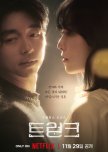
Flawed drama about flawed and broken people
The Trunk was filled with deeply flawed and wounded people. No one walked away looking like a hero by the time it was all over. There were many moments of frustration over truly idiotic decisions and the never welcome noble idiocy. Through it all Gong Yoo showed why he is a top actor regardless of country.Han Jeong Won cannot get over his ex-wife, Lee Seo Yeon, and takes the pills she supplies to sleep and get through the day. In order to maintain any contact with her he has to agree to a 1 year contract marriage to Noh In Ji. Lee married a younger man, Ji O, and uses him like a Boy Toy. Jeong Won and In Ji tie the knot by signing a contract which is stored in her designer trunk. The trunk and a dead body are later found with the police investigating this damaged group of people.
When a drama or movie bounces back and forth repeatedly in time, it’s usually a clue that the story isn’t that deep but the writers want to make it appear to be mysterious. Such was the case with this drama.
The story itself dragged most of the characters over the coals of desire and despair. Han made a terrible decision during a moment of anger and desperation. In Ji seemed to see what Han could not, yet made numerous idiotic decisions. Lee had a right to be angry even though she created a deadly situation, yet decided to punish Han into self-destruction. Not exactly the most likeable lot, yet Jeong Won and In Ji slowly dragged their way toward atonement. I was disappointed that a few of the familial elements were never cleared up.
The Trunk was stylishly shot and had a beautiful OST. Some of the acting was exemplary while some of it was perfunctory. The scattershot approach to storytelling was confusing at first but by the fourth episode was clearly laid out. Han’s mansion resembled a fun house with mirrored scenes and wild swirling circles and lines. The cold, severe decorating scheme would be enough to cause isolation issues. Shortcomings in stalking laws were brought up as well as a tyrannical view of bisexuality and terrible invasion of privacy and internet laws. For me, the only thing that held it together and made it worthwhile viewing was seeing Gong Yoo once again in a starring role even if his character was often shoved to the side. This was closer to a 7.5 drama but the cinematography, music, and GY’s acting bumped it up to an inflated 8 for me. Welcome back, Gong Yoo, don't stay away so long next time!
29 November 2024
Triggers: Sexual content and nudity. One gratuitous scene and other more “artistic” ones and two shower scenes that go lower than Kdramas.
Cet avis était-il utile?
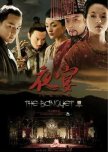
The rest is silence
You know to brace yourself for the pain when Feng Xiao Gang took on Shakespeare’s most famous tragedy in The Banquet. Vengeance, desire, madness, and treachery were never far away in this opulent film inspired by Hamlet.In a tale as old as time, a king is murdered by his brother who then steals his throne and empress. The Crown Prince lives in a bamboo forest with a theater group pining for his lost love who married his father. When the news arrives that his father is dead, killed by a “scorpion sting,” CP Wu Luan heads for the capital. Empress Wan loves Wu but also enjoys the perks and power of being an empress and is disappointed that Wu seems to have little interest in ruling the country. When Emperor Li declares a banquet, everyone in attendance is looking to murder someone else. Family gatherings can be a bear.
The role of Empress Wan was originally to go to Gong Li but due to scheduling conflicts was taken over by Zhang Zi Yi. In the book, the queen was Hamlet’s mother, but here, the young empress had been his lover. I would love to have seen what Gong Li would have brought to the role but ZZY availed herself well as the conflicted, scheming empress. Ge You brought out the fratricidal emperor’s lethal and sexy sides. Daniel Wu’s crown prince varied from brooding to whiny. That’s not a slam, Hamlet was one of the first emo “heroes.” Zhao Xun made the most of this version of Ophelia though Qing never went completely mad. Despite a strong cast, the writing let them down. By the end of the film, I wasn’t heavily invested in any of the characters. Ironically, Ge You’s acting pulled me in more than any of the other performances. It also didn’t help that I knew what the final course of the meal would be.
The story only thinly related to Hamlet and was told at a glacial pace. In order to spice things up there were some of the most erotic scenes I’ve observed in Chinese films. ZZY had a body double for the full backside scenes, something else you rarely see. The final scene strayed from the book in a puzzling manner which left a bad taste in my mouth. The dependable Yuen clan choreographed the few fight scenes which were elegant and bloody. One clandestine fight was more dance fu and foreplay than fists and kicks.
The Banquet excelled in its stunning cinematography, luxurious costumes, and beautiful score. This film was truly a treat for the eyes and ears. By utilizing blank masks and theater, the film gave us a story within a story. Everyone wore a mask in one form or another. The Banquet was a sumptuous feast for the eyes, but some of the dishes were a little bland.
12/12/24
AKA LEGEND OF THE BLACK SCORPION
Trigger warnings: A "romantic" rape. :(
Also, backside nudity and a few gratuitous breast shots that didn't show everything.
Cet avis était-il utile?
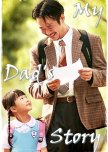
"He lies"
When watching Thai short films/commercials made by life insurance companies you can usually be assured of having your heartstrings tugged. A Dad’s Story was no exception. These companies know exactly how to hone in on your tear ducts.A young daughter and her father are walking as he reads a report she wrote for school. She describes how handsome, kind, generous, and sweet her dad is. He is Superman to her. And then like a punch to the gut he reads the next words, “…but he lies.” In the next minute she narrates how little eyes see everything. Love, sorrow, sacrifice, all rain down in her words.
MetLife didn’t give any answers to life’s hardships and unfairness, simply encouraged people to not give up because children’s futures are worth it. The three minutes of this commercial are also worth watching.
11 December 2024
Cet avis était-il utile?
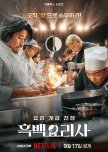
"Are they Squid Gaming us?"
Culinary Class Wars managed to highlight the Korean culinary world’s hierarchy without being mean spirited even with layers of ambition and main courses of egos served piled high. Chefs and judges Baek Jong Won and Anh Sung Jae were the ring masters who declared who stayed and who went home in this high stakes cooking competition.Eighty chefs, many self-taught or working as street vendors or in average restaurants came to take on 20 professional fine dining chefs for a prize worth 3 million won/215,000 (USD). The chefs on the lower rung of the hierarchy were titled Black Spoons and only given nicknames. The professional chefs were given the title of White Spoons and their real names were used. Only 20 Black Spoons would move on to the next level after the first challenge. After the winnowing, Black Spoons went head-to-head against the White Spoons in ever demanding challenges.
My favorite challenge was the Blindfolded Challenge. I’ve seen too many cooking shows where the established chef is treated deferentially and preferentially. The Pros freaked out when their advantage diminished. With only their senses and not their sight, Baek and Anh had to determine which dish tasted best. For this alone, I gave the show a .5 bump. The Infinite Cooking Hell mission would be my second favorite as the chefs had to utilize the blandest ingredient I can think of in numerous dishes. Honestly, I would have preferred for this to have been the semi-final with ALL of the remaining chefs participating to see what they were truly made of. The final by comparison was a limp noodle and anti-climactic. At least have them make a three-course meal to demonstrate a range of skills.
If I have any other quibbles, it would be with the editing. The class wars took place there as well. The Black Spoons also had a hierarchy. Two of the female contestants I was invested in, had much shorter screen time than most of the male BSs. It wasn’t difficult to determine who would be the finalists due to the editing as some chefs were barely shown.* There were also a couple of conflict of interests, including using Baek’s products in one challenge. The Professional Chinese chef’s protégé was given several second chances which wasn’t a good look. The maneuvering to keep some contestants and the ratio of White Spoons vs Black Spoons even was over obvious. Also, thirty minutes to do the introductions in the first episode was overkill. I’d rather watch them cook.
The culinary social statuses were clearly delineated. Early on the White Spoons may have admired some of the cooking techniques they observed by the Black Spoons, but often acted superior as if their skills were untouchable. After all, many of them were award winning, well established, famous, and far removed from prepping the highest quality ingredients for the meals served in their restaurants. The Black Spoons were mostly chefs fighting for recognition and validation, true hustlers innovating with the ingredients available to them. I will nearly always root for the underdog, and cheered each time a BS took down a WS, even more so when the WS had a shocked look as they tried to process losing. My heart broke for one Black Spoon who beat a White Spoon and was so overcome he pulled a peasant in a Sageuk and kneeled head to the floor in respect and was never acknowledged by the old dude.
The White Spoons had only their egos on the line. At first, they didn’t seem too worried about the rookies. As the WSs began to hit the floor it became obvious the BSs had nothing to lose and were playing for keeps. They weren’t just fighting for prize money, they were fighting for recognition and to show they were worthy of respect. The biggest exception I had to the White Spoons was Edward Lee. He embodied not only a competitive spirit but also a humility unusual for someone skilled in discovering unique and clever flavors and presentations. I’m still a little salty that one of his dishes was significantly downgraded over his name for the dish and not the flavor. Now that is culinary elitism at its best.
Many of the Black Spoons knew their chances of winning were slim, but they still persevered to prove themselves to others and to themselves. Despite working in what would appear to be basic places with whatever ingredients they could afford, they took pride in their food and desired recognition. Often judged for their lack of fine dining skills, they still prepared delicious food. I’m okay with the winner though the result felt too scripted, a common drawback in most cooking competitions. I was just relieved they didn’t turn it into a Game of Thrones or Squid Games to make the show more dramatic. Watching chefs work to create delicious and memorable dishes was thrilling and entertaining enough.
"Once you start walking you have to go all the way through to the end." Edward Lee
16 November 2024
*
*
*
*
*
*
*
*
#JusticeforTheLunchLady! I hated that her head-to-head competition with a White Spoon was barely shown. This was the biggest upset of that challenge for me! She survived several rounds and had very little screen time. She and Hanbok Auntie punched above their weight throughout the competition.
I did love the Italian chef's response when he lost, "Fabri always stays positive" while holding up finger hearts. And classy! I knew he was screwed when their ingredient to work with was skate.
While her attitude could sometimes grate, I had to admire Jung Ji Seon for her tenacity to become a famous chef in a profession often ruled by men.
Cet avis était-il utile?
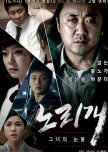
"Only mold grows in the shade"
The Secret Scandal was infuriating and discouraging. Loosely based on actress Jang Ja Yeon’s maltreatment and suicide, it caused this film to be even more painful because behind this sordid fictional story of abuse of power was a real woman who was let down by everyone. If you have triggers, please read the tags carefully.“Why is one actress so important to you?”
Lee Jang Ho has become an internet reporter after being fired from his television job. He’s diligently covering the trial of men accused of “coercion” and “abetting coercion” for an incident that happened in a club one night. Actress Jung Ji Hee committed suicide after being repeatedly coerced into sexual acts by her manager for himself and other men in power. Bound by a punitive contract, she was unable to get out of it unless she repaid 30 TIMES what the agency had spent on her. A new prosecutor’s mettle is tested when the good old boys draw ranks in order to thwart justice.
“Why would I remember your name?
Ma Dong Seok played Lee Jang Ho in a role where the only thing he fought was injustice. The famous ahjussi hitter did a good job as the reporter fighting to find and reveal the truth, one of the only positive male roles in the film. Lee Seung Yeon felt out of place as the tenacious prosecutor with a baby voice. I would have preferred an actress with a more dynamic screen presence. The film’s execution wasn’t as taut as it could have been. Jumping from character to character and also with numerous flashbacks, it had a tendency to feel disjointed which reduced its emotional punch.
“She’s just a girl”
The Secret Scandal’s story is an important one because 11 years later, the #MeToo movement has petered out against the solid wall erected by authoritative men. A 2010 report claimed that 62.8% of Korean actresses had been asked to perform sexual favors. Since this film came out there's been the Burning Sun scandal and now female acquaintances, co-workers, even family members are being turned into AI porn with few consequences. Men’s reputations and careers are too often valued over the careers and well-being of women’s as this film painfully pointed out. One particularly disturbing scene reminded me of a real-life rape that occurred on camera during the filming of Fatal Vacation (1990). Maybe when there are more women lawmakers, judges, film directors and producers, etc. something will change. It’s just taking too damn long. RIP Jang Ja Yeon, your suffering and life are still inspiring people to fight for the right to be safe and not be treated as a sexual commodity.
12 September 2024
Cet avis était-il utile?

 55
55 202
202 11
11






















